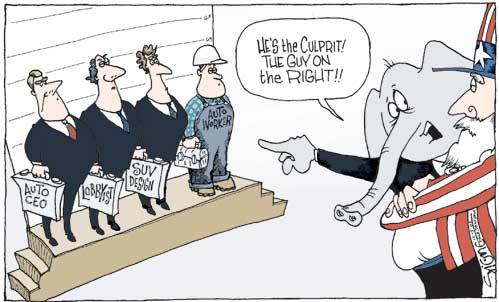Over the past few weeks I've had several interesting conversations with colleagues over what role unions and workers play - or have not played - in the auto crisis with the Big 3. A little morning diversion via the Boston Globe:
Wednesday, December 17, 2008
Are the Workers to Blame?
Subscribe to:
Post Comments (Atom)

3 comments:
The New York Times had an interesting article on what the "Big Three" pay their workers compared with other car companies. The difference was not so much in wages but in benefits. Legacy costs were particularly heavy. Like U.S. Social security legacy costs were put in place when it was assumed you retired at 65 and died at 66. Longevity has strained the legacy system. However, even with these costs the savings per car without them was about 500 dollars. That's something, but in vehicles that cost 25,000-30,000 dollars on average, its not the ballgame.
I do wonder, however, in general about wages in the industry. Whether big three or not, the average wage is somewhere between 75,000-95,000 dollars (US) a year. This is significantly more than many educators, social workers etc. are paid. It doesn't leave me wondering so much about unions as about wage equity or what we are saying about what we value.
I'd heard much the same about the costs of benefits. That said, even high benefits and high wages can survive in an industry with steady demand built on excellent product and service. Unions are not blameless here, but I'm pretty hesitant to blame high benefits packages for a bad product.
I think you're spot on about wages being a strong indicator of social and cultural values. Yet while capitalism - even social democratic capitalism - can build in structures that ensure a very basic kind of wage equity, I don't believe it can (or should) intervene to establish broader based wage equity. Political economy - as they say - is downstream of the culture. No economic or political package can create the values required to sustain it - they can make it easier, perhaps even facilitate their cultivation, but you can't - and should not - legislate the good life.
How about if you legislate the good life just for me? :)
Post a Comment